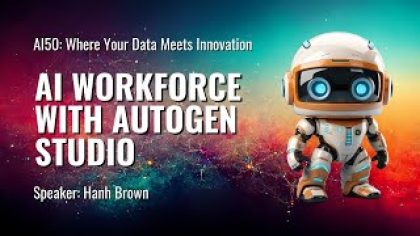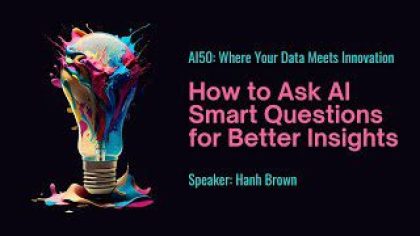Table of Contents
ToggleIn recent years, Artificial Intelligence (AI) has moved from the periphery to the core of marketing strategies. No longer the stuff of science fiction, AI is reshaping the landscape of business and consumer relations, breathing new life into how brands communicate, connect, and engage with their customers. Given the pace of change, the question is no longer whether AI will become integral to marketing but rather how deep its impact will be and how swiftly it will transform industries.
One field where the effect of AI is being keenly felt is in senior living marketing. Historically, this sector has been slow to adapt to technological shifts, but today it’s undergoing a significant evolution. Why? Because AI is emerging as a game-changer, opening new avenues for personalized, efficient, and sophisticated marketing strategies.
These innovative tools are not only improving lead generation and conversion but also helping to create a more dynamic, tailored experience for the seniors themselves. This shift is breathing new life into a sector often misunderstood or overlooked by the mainstream market.
AI is not merely a supplementary tool here, but a primary driver of marketing strategy, creating opportunities and challenges that would have been unthinkable just a few years ago. As we’ll explore in this piece, AI’s role in senior living marketing is not just significant—it’s transformative.
But what does this transformation look like, and how does it redefine senior living marketing? What can we learn from the successes and failures of AI application in this field? And most importantly, what does the future hold? These are the questions we will tackle as we delve into the role of advanced AI technologies in redefining senior living marketing.
The Advent of AI Technologies in Marketing
In the past decade, the advent of AI technologies has transformed marketing strategies in ways we couldn’t have envisioned before. The disruptive power of AI is creating new paradigms, unleashing innovative marketing techniques and tactics, and propelling the industry into uncharted territories.

Understanding the Role of AI in Marketing
AI plays a pivotal role in marketing by leveraging data to create personalized experiences, enhance customer engagement, and provide valuable insights. It’s the dynamic nature of AI, its ability to learn and adapt, that makes it an invaluable asset in this field.
One of AI’s critical contributions to marketing is predictive analysis, which enables businesses to anticipate customer behavior and trends. This function can drastically improve conversion rates and customer retention, while also streamlining sales and marketing efforts.
Moreover, AI has given birth to a host of new technologies. Chatbots, for instance, are AI-powered tools that interact with customers in real-time, providing immediate assistance and improving customer satisfaction. Another example is recommendation engines, which use AI algorithms to suggest products or services based on a user’s past behavior, enhancing personalized marketing.
Lastly, AI-powered tools can also analyze marketing campaign performance, enabling businesses to tweak their strategies based on accurate, real-time data. Thus, AI isn’t merely an add-on to existing marketing strategies, but a catalyst for reinvention and improvement.
The Shift towards AI-Driven Marketing
We’re currently witnessing a paradigm shift towards AI-driven marketing, owing to its extensive benefits and potential. Marketers are increasingly realizing that AI can empower them to deliver personalized content at scale, understand their customer base better, and optimize marketing efforts.
AI-driven marketing is not just about improving efficiency—it’s about unlocking new opportunities. With AI, marketers can automate repetitive tasks, freeing up time to focus on strategic initiatives. More importantly, AI can tap into unstructured data—like social media posts, customer reviews, and more—to glean insights that would otherwise remain untapped.
This shift towards AI-driven marketing is revolutionizing the industry, enhancing customer engagement, and driving revenue growth. However, it’s essential to remember that, as with any technological advancement, embracing AI involves a learning curve. Organizations must invest time in understanding these technologies and integrating them into their existing marketing systems effectively.
In the next sections, we’ll see how AI is specifically redefining senior living marketing, offering new ways to reach and engage with seniors, and reshaping how the industry operates.
The Senior Living Market
The senior living market represents a unique demographic with distinct needs and preferences. As society ages, and life expectancy continues to rise, the market has grown, warranting a specialized, technologically advanced approach to meet its evolving demands.

Unpacking the Senior Living Consumer
The senior living consumer, mainly comprised of individuals aged 65 and older, has a unique demographic and psychographic profile. It’s a diverse group spanning various generations, cultures, and lifestyles, with significant differences in terms of technology use, health status, and living situations.
These seniors have specific needs and preferences which are often different from other age groups. They require more personalized services and products that cater to their health and wellness needs, lifestyle preferences, and technology usage patterns.
The psychographic profile of seniors also paints a picture of individuals who value independence, are cautious about spending, and prioritize comfort and security. Despite stereotypes to the contrary, many seniors today are tech-savvy, active on social media, and open to using digital platforms for a range of activities, including shopping, socializing, and accessing services.
In terms of marketing, these characteristics necessitate strategies that are personalized, respectful of their independence, and tailored to their lifestyle and technology use. This is where AI-driven marketing strategies come into play, enabling more nuanced targeting, personalized messaging, and enhanced customer service.
The Need for AI Technologies in Senior Living Marketing
Senior living marketing faces unique challenges. Not only does it need to reach and engage with seniors, but it also often involves communicating with their family members who are instrumental in decision-making processes. The heterogeneity of the senior living market, therefore, requires sophisticated marketing approaches, and this is where AI technologies shine.
AI can analyze data from various sources to understand seniors’ needs and preferences better, helping marketers develop personalized marketing strategies. It can also predict trends and behaviors, allowing businesses to tailor their offerings more effectively.
Furthermore, AI-driven chatbots can provide real-time, personalized customer service, helping seniors find the information they need quickly and easily. Meanwhile, predictive analytics can help identify potential leads and optimize marketing efforts.
The advent of AI technologies in senior living marketing is therefore not a luxury but a necessity. These advanced tools are transforming the way the industry connects with its customers, paving the way for more effective and efficient marketing strategies. In the next sections, we’ll delve deeper into the specific applications of AI in senior living marketing and the transformative impact they’re having.
AI Technologies for Senior Living Marketing
In this rapidly evolving technological age, AI technologies are redefining marketing, particularly within the niche of senior living. These tools are helping businesses understand their senior customers better, anticipate their needs, and offer personalized experiences. By implementing AI technologies in marketing strategies, senior living businesses are paving the way for more targeted outreach, more efficient processes, and ultimately, enhanced customer satisfaction.

AI-Powered Marketing Tools for Senior Living
Several AI-powered tools and techniques have surfaced that can enhance senior living marketing strategies. One such tool is AI chatbots, which are transforming the way businesses interact with seniors. For instance, CarePredict, a senior care technology company, has implemented an AI chatbot that assists seniors and their families in obtaining information about services and facilities, providing real-time support.
Another notable tool is AI-powered predictive analytics. Consider the case of Eldermark, a senior housing software solution, which uses AI to analyze data and predict trends, helping businesses improve their marketing strategies. The software processes vast amounts of data, spotting patterns and predicting future behaviors, ultimately aiding in optimizing sales efforts.
AI also powers personalization tools that deliver targeted content to seniors. One example is Deep6 AI, a company that utilizes AI to match seniors with clinical trials based on their medical conditions and preferences. These tailored experiences have shown to enhance user engagement and satisfaction significantly.
Predictive Analysis and AI: The Future of Senior Living Marketing
Predictive analysis is an advanced AI technology that holds enormous potential to shape the future of senior living marketing strategies. It can sift through volumes of data, identify trends, and predict future outcomes, enabling businesses to anticipate seniors’ needs and make data-driven decisions.
A remarkable example of predictive analytics in action is the work being done by SingFit PRIME, a therapeutic music program for seniors. Using AI, they analyze participant data to predict seniors’ engagement levels, helping them tailor their program and enhance user experience.
Predictive analytics also holds promise for lead scoring and conversion. By analyzing past behaviors and trends, AI can help marketers predict which leads are likely to convert, resulting in more efficient use of resources and better return on investment.
As we look towards the future, the union of predictive analysis and AI in senior living marketing is poised to bring unprecedented personalization and efficiency. It offers the prospect of understanding seniors like never before, bridging gaps in communication, and transforming how we meet their unique needs. It’s not just a wave of change—it’s a whole new ocean of possibilities.
Harnessing AI for Effective Senior Living Marketing
Harnessing AI technologies for effective senior living marketing is not merely a competitive advantage—it’s quickly becoming an industry standard. With the right approach, businesses can integrate AI into their marketing strategies to enhance customer engagement, boost conversion rates, and improve overall marketing efficiency.
Steps to Incorporating AI into Your Marketing Strategy
Incorporating AI into your marketing strategy involves a systematic approach. The first step is understanding your goals. What do you aim to achieve with AI? Is it improving customer engagement, personalizing marketing efforts, or increasing conversion rates? Having a clear objective will guide your AI implementation strategy.
Next, consider an AI readiness assessment. This includes evaluating your existing technology infrastructure, data management capabilities, and staff skills. This assessment will help identify gaps and provide a roadmap for AI integration.
Choosing the right AI tools is the next crucial step. There are several AI solutions available, each with different features and benefits. Evaluate your needs, budget, and the compatibility of the tools with your existing systems when making a decision.
Finally, monitor the implementation and make necessary adjustments. AI is not a “set it and forget it” solution. Continuous monitoring and tweaking are needed to ensure optimal results. Be patient; the benefits of AI integration will not always be immediate but will be significant in the long run.
Case Study: Success Stories in AI-Driven Senior Living Marketing
Several senior living companies have successfully incorporated AI into their marketing strategies. One such success story is Aegis Living. They implemented an AI-based customer relationship management (CRM) system that collects and analyzes data from various sources to create detailed customer profiles. This system enables personalized interactions with prospective customers, leading to improved conversion rates.
Another success story is Maplewood Senior Living. They adopted an AI-powered chatbot that provides immediate assistance to seniors and their families. This chatbot not only improved customer service but also freed up staff time for more complex tasks.
Finally, Brookdale Senior Living has successfully leveraged predictive analytics in their marketing strategy. They use AI to analyze data and predict seniors’ needs and preferences, helping them tailor their services and marketing messages effectively. These companies exemplify how AI can revolutionize senior living marketing, paving the way for other businesses in the industry to follow suit.
Conclusion
The transformative potential of advanced AI technologies in senior living marketing is undeniable. From AI-powered chatbots providing real-time support to predictive analytics forecasting future trends and behaviors, AI is making marketing strategies more effective and efficient.
The impact of AI isn’t merely operational; it’s deeply personal. It’s about understanding seniors’ unique needs, respecting their independence, and providing personalized services that cater to their lifestyle. This nuanced understanding, fueled by AI, enables marketers to connect with seniors and their families in ways that are authentic, respectful, and meaningful.
As we’ve seen, incorporating AI into your marketing strategy is not an overnight process, but a journey. It requires understanding your goals, assessing your readiness, choosing the right tools, and being patient with the implementation process. However, the payoff is worth the effort. Companies like Aegis Living, Maplewood Senior Living, and Brookdale Senior Living have shown that the successful integration of AI can lead to enhanced customer engagement, improved conversion rates, and increased overall efficiency.
In the face of rapid technological advancement, the challenge for senior living marketers is to keep pace and adapt. AI technologies represent a significant opportunity for those willing to embrace the change. By harnessing the power of AI, senior living marketers can redefine their strategies, stand out in a competitive marketplace, and ultimately, provide a superior experience for seniors.
In the era of AI, the future of senior living marketing is here. It’s time for marketers to embrace the change and harness the power of AI to transform their strategies, their businesses, and the lives of seniors they serve.
FAQs
How can advanced AI technologies redefine senior living marketing strategies?
Advanced AI technologies can redefine senior living marketing strategies by enabling a more personalized, efficient, and predictive approach. AI can analyze vast amounts of data to understand seniors’ needs and preferences better, allowing for the development of highly targeted marketing campaigns. Tools like AI chatbots can enhance customer service by providing real-time support, while predictive analytics can identify future trends, enabling marketers to anticipate customers’ needs and adjust their strategies accordingly.
What are some practical steps to incorporate AI technologies into my marketing strategy?
There are several steps to incorporate AI technologies into your marketing strategy. Firstly, define your goals. What do you aim to achieve with AI? Next, conduct an AI readiness assessment to understand your current capabilities and identify areas that need improvement. Then, choose the right AI tools based on your needs and budget. Implement the chosen AI technologies into your operations, monitor the performance, and make necessary adjustments for optimal results.
What are some successful examples of AI-driven senior living marketing?
Several senior living providers have successfully adopted AI technologies in their marketing strategies. Aegis Living, for example, uses an AI-based CRM system for personalized customer interactions. Maplewood Senior Living uses an AI-powered chatbot to improve customer service, while Brookdale Senior Living uses predictive analytics to tailor their services and marketing messages to seniors’ needs and preferences.
How can predictive analysis shape the future of senior living marketing?
Predictive analysis, an advanced form of AI, can significantly shape the future of senior living marketing by predicting future trends and behaviors. By analyzing past behaviors and patterns, AI can help marketers anticipate the needs of seniors, enabling more personalized and effective marketing strategies. It can also predict which leads are more likely to convert, leading to more efficient use of marketing resources.
Can AI technologies improve customer engagement in senior living marketing?
Yes, AI technologies can significantly improve customer engagement in senior living marketing. AI-powered tools can provide personalized interactions, real-time support, and predictive insights, all of which can enhance the customer experience. They can also help marketers better understand their customers, leading to more relevant and engaging marketing content.
Reference
- https://www.whitehouse.gov/
- https://www.whitehouse.gov/
- https://www.bildandco.com/




-qmbs5n2xf3phdge81somleabvf62vb440rax2cr684.png)
-qmbs5jbknrkc30jonr24bf8hhvom0ip6o8oz58wqx0.png)











